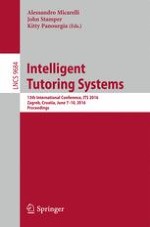This book constitutes the refereed proceedings of the 13th International Conference on Intelligent Tutoring Systems, ITS 2016, held in Zagreb, Croatia, in June 2016.
The 20 revised full papers, 32 short papers, 35 posters, and 7 young researchers’ track papers presented in this volume were carefully reviewed and selected from 147 submissions. The specific theme of the ITS 2016 conference is "Adaptive Learning in Real World Contexts".
ITS 2016 covers a wide range of topics such as: intelligent tutoring; informal learning environments, learning as a side effect of interactions; collaborative and group learning, communities of practice and social networks; simulation-based learning and serious games; dialogue and discourse during learning interactions; co-adaptation between technologies and human learning; ubiquitous and mobile learning environments; empirical studies of learning with technologies, understanding human learning on the web; adaptive support for learning, models of learners, diagnosis and feedback; modeling of motivation, metacognition, and affect aspects of learning; recommender systems for learning; virtual pedagogical agents and learning companions; ontological modeling, semantic web technologies and standards for learning; multi-agent and service oriented architectures for learning and tutoring environments; educational exploitation of data mining and machine learning techniques; instructional design principles or design patterns for educational environments; authoring tools and development methodologies for advanced learning technologies; domain-specific learning technologies, e.g. language, mathematics, reading, science, medicine, military, and industry; non conventional interactions between artificial intelligence and human learning; and privacy and security in e-learning environments.
